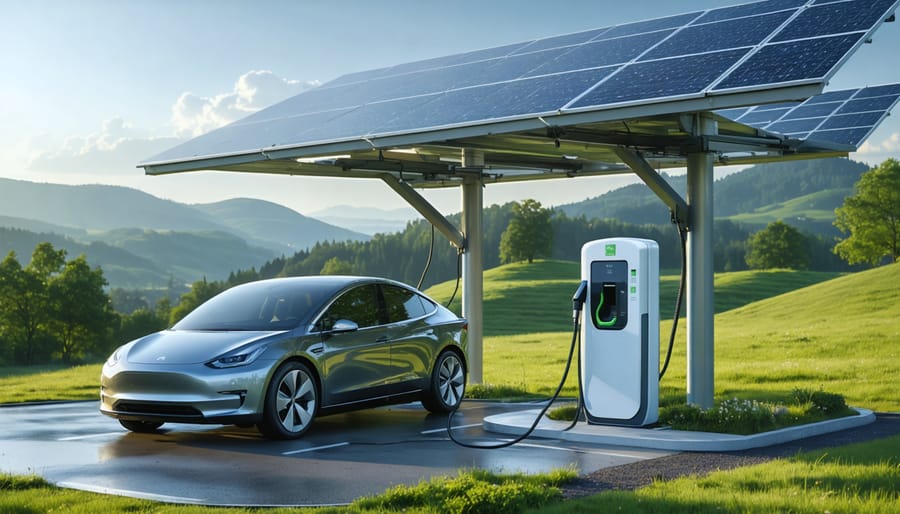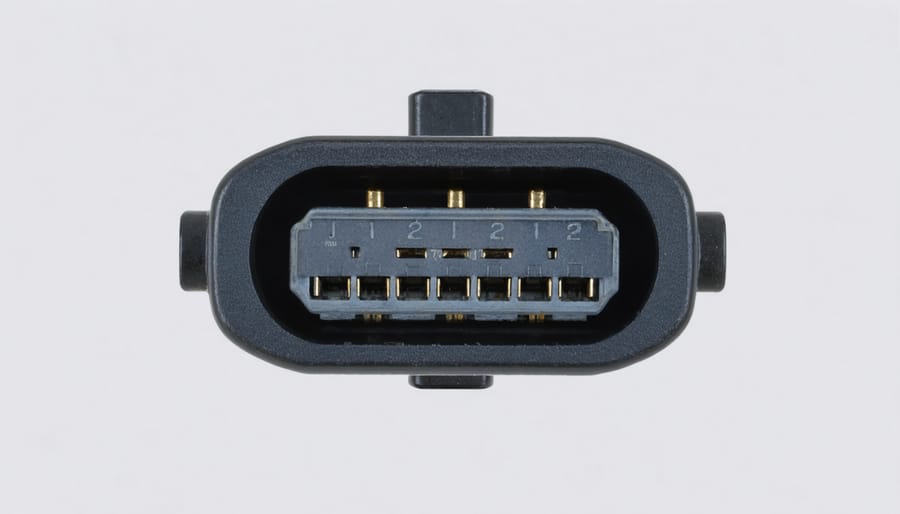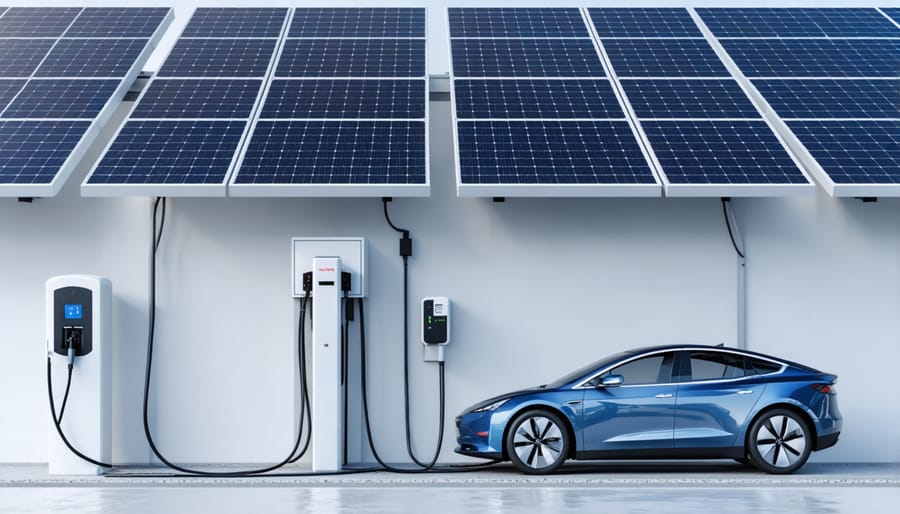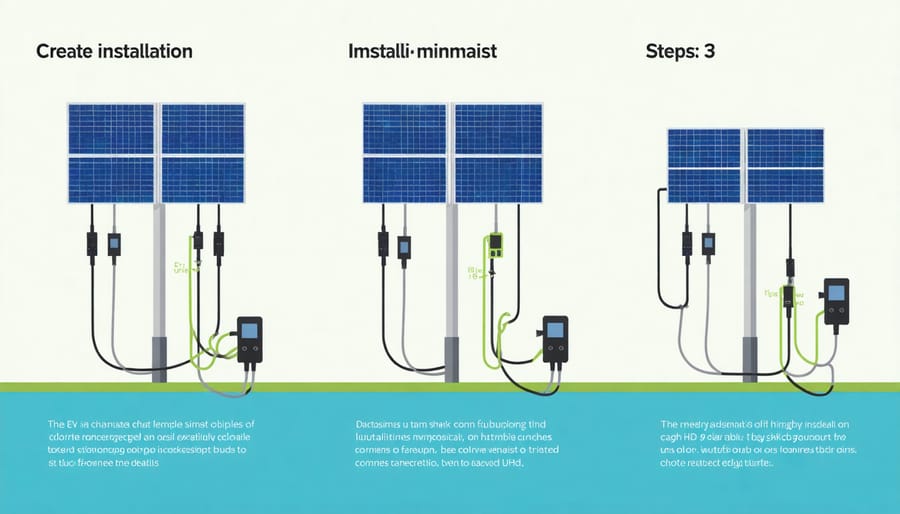Solar-Powered J1772 Chargers: Transform Your EV Charging with Clean Energy

Transform your electric vehicle charging infrastructure with a J1772 solar charger, the cornerstone of sustainable transportation that seamlessly connects solar-powered EV charging stations with any compatible electric vehicle. This innovative charging solution harnesses clean solar energy to power your EV, significantly reducing both energy costs and carbon emissions while ensuring reliable charging performance throughout the year.
By integrating photovoltaic panels with J1772-compliant charging equipment, property owners can generate their own charging power, store excess energy for nighttime use, and contribute to Europe’s renewable energy goals. The system’s sophisticated power management technology automatically optimizes charging efficiency based on available solar output, grid electricity prices, and vehicle charging requirements.
Whether you’re a homeowner looking to charge your EV sustainably or a business owner aiming to provide green charging solutions, the J1772 solar charger represents a strategic investment in future-proof infrastructure. With European regulations increasingly favoring renewable energy solutions, this technology offers both environmental benefits and long-term cost advantages while maintaining universal compatibility with Type 1 charging protocols.
Understanding J1772 Solar Charging Systems
J1772 Connector Standards and Compatibility
The J1772 connector, also known as Type 1 or SAE J1772, represents a widely adopted standard for electric vehicle charging across Europe and globally. This connector specification ensures safe and efficient charging through a sophisticated five-pin design that handles both power transfer and communication between the vehicle and charging station.
Compatible with most electric vehicles manufactured for European markets, the J1772 connector supports AC charging at rates up to 19.2 kW. The standard features built-in safety mechanisms, including proximity detection and pilot signal monitoring, which prevent accidental disconnection during charging and ensure proper power delivery.
While predominantly used in Level 2 charging applications, the J1772 standard seamlessly integrates with solar charging systems, making it ideal for sustainable home charging solutions. European vehicle manufacturers have widely embraced this standard, with adaptors available for vehicles using alternative connector types.
The connector’s robust design meets IP54 weather resistance requirements, ensuring reliable operation in various European climate conditions. This standardisation has played a crucial role in advancing electric mobility while supporting the integration of renewable energy sources into charging infrastructure.

Solar Integration Components
A successful J1772 solar charger installation requires careful integration of several key components within your solar power system design. High-efficiency solar panels form the foundation, typically requiring 2-4 kW capacity for standard residential EV charging. These panels connect to a grid-tie inverter, which converts DC power to AC power suitable for EV charging.
A charge controller acts as the system’s brain, managing power flow and protecting both the batteries and charging equipment. For optimal performance, smart charge controllers with MPPT (Maximum Power Point Tracking) technology are recommended, offering up to 30% more efficiency compared to traditional controllers.
Energy storage solutions, typically lithium-ion batteries, enable charging during non-sunny periods. A minimum capacity of 7 kWh is advised for reliable overnight charging. The system also requires proper safety components, including surge protectors, circuit breakers, and monitoring equipment to ensure safe operation and system longevity.
Integration with existing electrical infrastructure demands professional installation, ensuring compliance with European safety standards and local regulations.
Benefits of Solar-Powered J1772 Charging

Environmental Impact and Sustainability
The integration of J1772 solar chargers represents a significant step forward in reducing the environmental impact of electric vehicle charging. By harnessing solar energy, these charging systems can potentially eliminate up to 1.5 tonnes of CO2 emissions per vehicle annually compared to grid-based charging systems. This calculation assumes average European driving patterns and solar energy availability.
The sustainability benefits extend beyond mere carbon reduction. Solar-powered EV charging creates a closed-loop renewable energy system, where vehicles are powered directly by the sun’s energy. This approach minimizes dependency on the traditional power grid and reduces the overall strain on existing energy infrastructure during peak charging times.
For European homeowners and businesses, J1772 solar chargers contribute to meeting EU climate targets while supporting local renewable energy initiatives. The systems typically generate excess power during optimal sunlight hours, which can be stored or fed back into the grid, creating a more resilient and sustainable energy network.
The long-term environmental advantages are particularly noteworthy. A properly maintained solar charging system has an operational lifespan of 25-30 years, during which it continuously produces clean energy. This translates to approximately 37.5-45 tonnes of CO2 emissions avoided per charging point over its lifetime, contributing significantly to Europe’s decarbonisation goals while providing reliable, sustainable transportation power.
Cost Savings and ROI
Installing a J1772 solar charger represents a significant investment in sustainable technology that can dramatically reduce energy costs over time. The initial investment typically ranges from €2,000 to €5,000, depending on system capacity and installation requirements. However, the financial benefits become evident through multiple channels.
Most European homeowners experience a return on investment within 4-6 years through reduced electricity bills and government incentives. Solar-powered EV charging can save approximately €800-1,200 annually on charging costs compared to grid electricity, based on average European electricity rates and typical EV usage patterns.
Many European countries offer substantial incentives for solar charging installations, including tax rebates, grants, and feed-in tariffs. For instance, Germany provides up to 40% of the installation costs through various programs, while France offers tax credits of up to €2,000 for residential installations.
The system’s longevity further enhances its value proposition, with most components carrying 20-25 year warranties. When factoring in rising electricity costs and increasing EV adoption rates, the long-term savings potential becomes even more compelling. Additionally, properties with solar charging capabilities often see increased market value, with studies showing a 3-4% premium on resale values.
Installation and Implementation
Site Assessment and Planning
Before installing a J1772 solar charger, conducting a thorough site assessment is crucial for optimal performance and compliance with local regulations. Begin by evaluating your property’s solar potential, considering factors such as roof orientation, angle, and available surface area. South-facing installations typically yield the best results in European locations, with an ideal tilt angle between 30-40 degrees.
Assess your electrical infrastructure, including your current service capacity and distribution board specifications. Most residential J1772 installations require a dedicated circuit and appropriate safety devices. Document your typical daily energy consumption patterns and EV charging needs to properly size the solar array and charging system.
Consider environmental factors such as shade from nearby buildings or trees, which can significantly impact solar panel efficiency. Local weather patterns and seasonal variations will also affect system performance. Check regional building codes and obtain necessary permits, particularly important in European jurisdictions with specific renewable energy regulations.
Evaluate the distance between your proposed solar array location and the EV charging point, as longer cable runs can affect system efficiency and installation costs. Plan for future expansion by allowing additional space for potential system upgrades. Consider ground-mounted options if roof installation isn’t feasible, ensuring proper clearance and accessibility for maintenance.
Consult with certified installers who understand both solar and EV charging technologies to develop a comprehensive installation plan that maximizes efficiency while meeting safety standards.

Professional Installation Process
Installing a J1772 solar charger requires careful planning and professional expertise to ensure safety and optimal performance. The process typically begins with a comprehensive site assessment by a certified electrical contractor who evaluates your existing electrical infrastructure and solar capacity. This assessment determines the most suitable location for the charger and identifies any necessary upgrades to your electrical system.
A qualified installer will then create a detailed installation plan that complies with local regulations and European safety standards. The installation process includes mounting the charging unit, establishing proper electrical connections, integrating with your solar PV system, and implementing necessary safety measures such as surge protection and proper grounding.
The professional team will also configure the smart charging features, ensuring seamless communication between your solar system and the EV charger. This includes programming charging schedules to maximise solar power utilisation and setting up monitoring systems for performance tracking.
Post-installation, your contractor should conduct thorough testing and provide comprehensive documentation, including warranty information and operational guidelines. Many installers also offer ongoing maintenance support to ensure long-term reliability and efficiency.
Maintenance and Monitoring
Regular maintenance and monitoring are crucial for ensuring optimal performance of your J1772 solar charging system. Conduct monthly visual inspections of the charging connector, cables, and mounting hardware for signs of wear, damage, or loose connections. Clean the solar panels quarterly, or more frequently in dusty environments, using appropriate cleaning solutions and soft materials to maintain maximum energy generation efficiency.
Install a monitoring system to track key performance metrics such as charging speed, energy production, and consumption patterns. Many modern systems offer smartphone apps or web interfaces that provide real-time data and historical analysis. Set up automated alerts for any significant deviations from normal operation parameters.
Check weather seals and electrical connections annually, and have a qualified technician perform a comprehensive system inspection every two years. Keep detailed maintenance records, including dates of inspections, cleaning sessions, and any repairs or replacements. This documentation helps track system performance over time and can be valuable for warranty claims or troubleshooting.
For optimal safety, test the emergency stop function and ground fault protection monthly, and ensure all warning labels remain visible and legible. Replace any damaged components promptly using manufacturer-approved parts to maintain system integrity and certification compliance.
Future-Proofing Your Investment
Upgradeability and Expansion Options
J1772 solar charging systems offer excellent flexibility for future expansion and upgrades, making them a future-proof investment for both residential and commercial applications. The modular nature of these systems allows for seamless integration of additional solar panels when energy needs increase or budget permits. Users can start with a basic setup and gradually enhance charging capacity by adding more panels or upgrading inverter capabilities.
The charging infrastructure can be expanded to accommodate multiple vehicles by installing additional charging points, all powered by the same solar array. Modern J1772 systems also support smart energy management features, which can be activated through software updates without requiring significant hardware modifications.
For those considering battery storage integration, most J1772 solar chargers are compatible with various energy storage solutions. This allows for future addition of battery systems to optimize charging during non-sunny periods. The systems can also be upgraded to include advanced monitoring capabilities, enhanced safety features, and improved communication protocols as technology evolves, ensuring your charging solution remains current with industry standards and technological advancements.
Smart Integration Features
Modern J1772 solar chargers incorporate advanced connectivity features that enhance charging efficiency and user experience. Through smart charging integration, these systems can automatically adjust charging schedules based on solar production peaks and energy pricing.
The built-in monitoring capabilities allow users to track charging sessions, energy consumption, and solar generation through smartphone applications or web portals. Many models feature dynamic load balancing, ensuring optimal power distribution between household consumption and EV charging while prioritizing solar energy usage.
Future-ready connectivity options include integration with home energy management systems (HEMS), smart meters, and vehicle-to-grid (V2G) capabilities. These features enable automated responses to grid demands and potential revenue generation through energy trading schemes.
Advanced models support over-the-air updates, ensuring compatibility with emerging protocols and security standards. The integration possibilities extend to smart home platforms, allowing voice control and automated scheduling based on weather forecasts and energy availability.
The integration of J1772 solar chargers represents a significant step forward in sustainable transport solutions for Europe. By combining solar power with EV charging capabilities, property owners can significantly reduce their carbon footprint while enjoying substantial energy cost savings. The technology’s compatibility with most electric vehicles, coupled with its reliable performance and smart monitoring features, makes it an attractive investment for both residential and commercial applications. As Europe continues its transition towards renewable energy, solar-powered EV charging stations will play an increasingly vital role in our sustainable future. We encourage property owners to embrace this innovative charging solution, contributing to a cleaner environment while future-proofing their energy infrastructure. With proper planning and professional installation, a J1772 solar charging system can provide years of reliable, cost-effective, and environmentally responsible vehicle charging.
Leave a Reply